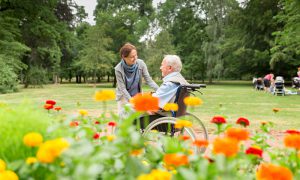Latest News from Everycare
 More than a quarter of elderly people have kept a fall they had at home a secret from family and friends (26 per cent), with some believing they can deal with care issues themselves and others not wanting to admit they’re getting older or be labelled ‘vulnerable’.
More than a quarter of elderly people have kept a fall they had at home a secret from family and friends (26 per cent), with some believing they can deal with care issues themselves and others not wanting to admit they’re getting older or be labelled ‘vulnerable’.
A study of 2,000 people aged 65+, commissioned by the Connected Care Platform provider Anthropos, were asked why they kept it secret, with 26 per cent saying they can deal with any care issue themselves, 16 per cent don’t want to be labelled ‘vulnerable’ and 18 per cent don’t want to acknowledge they’re getting older.
Almost a third (29 per cent) of people aged 65+ have hidden their need for any type of care support from loved ones.
To read the full story visit homecare.co.uk

People leaving work to care for someone are losing out on nearly £6,000 per year in income on average, new figures suggest.
More than 5 million people provide some form of unpaid care, according to the latest census figures, with 2 million doing so for more than 20 hours per week.
But taking time out from work to care for others means they face an effective penalty of almost £500 per month, the Joseph Rowntree Foundation (JRF) estimated. This can rise to as high as £9,000 per year after six years of providing unpaid care, it said.
This is because most of these carers are unable to find other sources of income, with more than a quarter not receiving a pension, carers’ allowance or universal credit, the foundation found.
Abby Jitenda, of the JRF, said: “It’s not right that unpaid carers on low incomes are losing out on thousands of pounds, and being pushed into poverty as they can no longer work, while providing much-needed care that benefits us all.”
Earlier this year, Parliament passed the Carer’s Leave Act, which is designed to give unpaid carers one week of unpaid leave a year. However, Ms Jitenda added this did not go far enough to stop people from dropping out of work when care needs intensified.
For more information visit the Telegraph website.

First, the GP will try to rule out any underlying physical or mental causes of the symptoms – many of which can be treated – such as:
· depression
· anxiety
· vitamin deficiency
· diabetes
· hormonal conditions
· menopause
The GP will ask about the person’s symptoms, when they started, how they affect their daily life, and their family medical history.
It is a good idea to keep a record of symptoms for a few weeks to show the GP.
It is also helpful for a family member or friend to go to the appointment with the person so they can talk about any changes they have seen.
The GP is likely to carry out a short memory and concentration test. This may include:
· stating the day, date and year
· naming pictures of common objects, eg keys, kettle
· remembering and repeating a list of items
· completing a simple drawing, eg putting numbers on a clock face
The GP should also arrange blood tests, an ECG (a check of heart rhythm) and a head scan.
If other causes of the person’s symptoms are ruled out, the GP should refer them to a specialist memory clinic for more detailed assessments and further scans such as an MRI or CT scan to look for changes in the brain.
It may take several appointments and tests over a number of months to get a diagnosis of Alzheimer’s disease.
Receiving a diagnosis of Alzheimer’s disease can be a relief for some people, as they have an explanation for what is happening to them and can access the support they need. For others, it can be upsetting and overwhelming
Being socially active in your fifties and sixties lowers the risk of developing dementia in later life, according to new research.
Academics at University College London found that someone who saw friends almost daily at the age of 60 was 12 per cent less likely to develop dementia than someone who only saw one or two friends every couple of months.
Having an active social life “at any age may well have a similar impact on reducing dementia risk”, according to the researchers.
Socialising promotes the use of memory and language, which could help minimise the effect of dementia, according to Professor Gill Livingston, a senior author of the report.
She added: “People who are socially engaged are exercising cognitive skills such as memory and language, which may help them to develop cognitive reserve – while it may not stop their brains from changing, cognitive reserve could help people cope better with the effects of age and delay any symptoms of dementia.
Read more by visiting The Independent website.
 More than a quarter of elderly people have kept a fall they had at home a secret from family and friends (26 per cent), with some believing they can deal with care issues themselves and others not wanting to admit they’re getting older or be labelled ‘vulnerable’.
More than a quarter of elderly people have kept a fall they had at home a secret from family and friends (26 per cent), with some believing they can deal with care issues themselves and others not wanting to admit they’re getting older or be labelled ‘vulnerable’.


